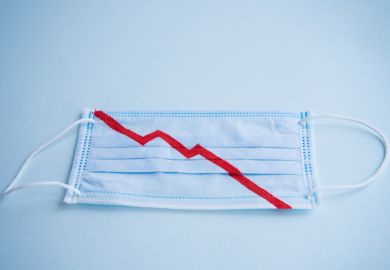Shortly before many UK university staff packed up for summer after what, no doubt, had been a very stressful term, they might have read the chief executive of the Universities Superannuation Scheme’s account of how Covid-19 has ravaged one of the country’s few remaining defined benefit pension schemes.
No doubt many were already concerned about their pensions. Last year, some of them had taken part in strike action. Now they read that the gap between what the USS was promising them and the assets it had available for this had lurched from “only” £3.6 billion to over £12 billion by May. And now it’s closer to £13 billion. The scheme faced hard decisions. However, CEO Bill Galvin offered succour. The USS now has a “revised” methodology.
As a long-term observer of the USS, I thought I might like to learn more about what this methodology was. But it was hard work. The USS’s media team provided me with some links to documents that, true to form, were well buried on the USS website, with no reference to them on the USS’s main pages that might help an aficionado such as me, let alone the uninitiated.
In fact, the revised methodology was to be found in a 55-page document that had been released at the beginning of March. A finance professor friend called it “a baroque edifice” and judged it as having been constructed “in a manner that seems to defy logic and create confusion”.
Be that as it may, the important point for university staff to absorb is that it’s Covid that is responsible for all the problems. Forget that, last time, it was the Pensions Regulator being too strict. Or that the time before that, it was quantitative easing. And we must never discuss the USS’s asset allocation strategy – let alone the products that it selects to invest in.
According to the USS’s way of reckoning, it all started to go wrong from about March. However, under internationally recognised accounting conventions, the deficit was already at £8.4 billion (not £3.6 billion) in March 2018. It rose to £11.8 billion a year later, and to £13.2 billion by March 2020 (something well hidden in the latest annual report).
So what does the “revised methodology” say should be done? First, the USS wants to stop any more rats leaving the sinking ship – no more Trinity College, Cambridges. Employers voted in May to support that provision, but the ayes represented only 40 per cent of active members, so there are quite a lot of doubts about whether this will actually happen. Still, requiring members not to pull out is necessary if the USS is to endure over the 30 years it might need to set itself to rights.
But over these 30 years, it will also have to invest in pretty high-yielding products. And higher yielding, of course, means higher risk. The investment strategy seems to rely upon the law of large numbers: you expect the rate of return to fluctuate, but if you stick at investing long enough, the highs and the lows will cancel out, and the return you desire will be achieved.
What the USS fails to remember is that the lows can be large, and they can also come at the wrong time. If you were to spoil your holiday by studying the Black-Scholes model of derivatives markets, you could calculate the insurance premium investors would have to pay to ensure they obtained the investment return they expected. The value of that premium rises exponentially with time. This, of course, is why no one buys such insurance.
This leaves only two ways forward if the USS is to survive. Contribution rates will have to go up – dramatically, and far more than the levels so far discussed. Forty per cent of salary might be required. Whether university heads, who are already feeling cash-strapped and facing major shortfalls next year, would be prepared to cough up is questionable. Bailing out the USS is certainly not a component of the UK government’s emergency rescue plan for universities. And staff have already struck over proposed contribution increases that were far more modest.
The alternative is that the USS closes the defined benefit component of the scheme and switches all members to a defined contribution plan. This was proposed back in 2017, only to be withdrawn following massive opposition. Yet this option can no longer be wished away.
So this is one more thing that USS members sitting on the beach will have to worry about when they go back to work. That is, if they go back at all. Those on fixed-term contracts might already have learned that these have not been renewed. Those who were hourly paid might find themselves not being called back. Even those with open-ended contracts might find the redundancy letter awaiting – or, at best, a cut to the salary out of which they’ll have to pay the new USS contributions.
But at least one person might be having a nice holiday – the USS’s Bill Galvin. His pay rose 24 per cent over the last year, to just under £700,000 including his bonus. He’ll be licking his ice cream happily enough.
Bernard H. Casey is a retired USS member who also worked for the Organisation for Economic Cooperation and Development. He now runs a consultancy, SOCialECONomicRESearch, in Frankfurt and London.
Register to continue
Why register?
- Registration is free and only takes a moment
- Once registered, you can read 3 articles a month
- Sign up for our newsletter
Subscribe
Or subscribe for unlimited access to:
- Unlimited access to news, views, insights & reviews
- Digital editions
- Digital access to THE’s university and college rankings analysis
Already registered or a current subscriber?








